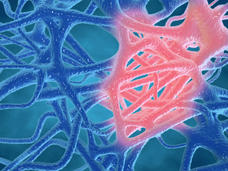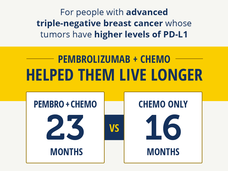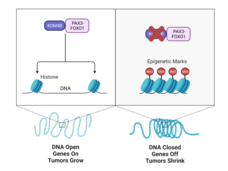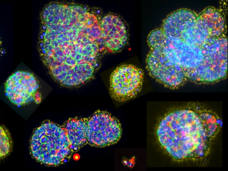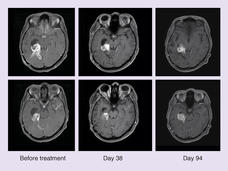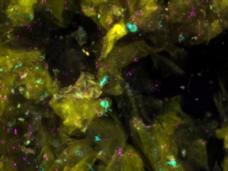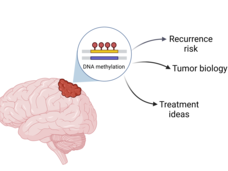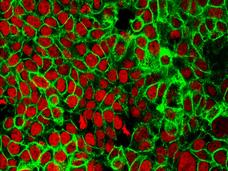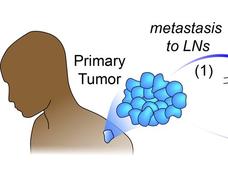Cancer Currents: An NCI Cancer Research Blog
A blog featuring news and research updates from the National Cancer Institute.
-
Targeting Inflammation Emerges as a Strategy for Treating Cancer
Inflammation is considered a hallmark of cancer. Researchers hope to learn more about whether people with cancer might benefit from treatments that target inflammation around tumors. Some early studies have yielded promising results and more are on the horizon.
-
Pembrolizumab Improves Survival in Advanced Triple-Negative Breast Cancer
Adding the immunotherapy drug pembrolizumab (Keytruda) to chemotherapy can help some patients with advanced triple-negative breast cancer live longer. In the KEYNOTE-355 trial, overall survival improved among patients whose tumors had high levels of the PD-L1 protein.
-
Targeting the Accomplice: A Potential Treatment Approach for Rhabdomyosarcoma
The fusion protein that drives the growth and survival of some rhabdomyosarcoma tumors relies on the KDM4B enzyme, researchers have found. Treating mice with a KDM4B-blocking drug and chemotherapy nearly eliminated rhabdomyosarcoma tumors with the fusion protein.
-
Aided by Community Health Workers, People with Advanced Cancer Need Fewer Hospital Visits
Regular visits and calls from community health workers showed many benefits for those with advanced cancers, from greater use of palliative care to improved quality of life, a new study has shown.
-
New Cancer Model Shows Promise in Predicting If Treatment Will Shrink Tumors
A research team hopes to offer oncologists a new tool to guide treatment choices for their patients. In a small study, a tumor model called micro-organospheres accurately predicted whether patients would respond to their chemotherapy treatment.
-
Disguising Cancer as an Infection Helps the Immune System Eliminate Tumors
NCI researchers are developing an immunotherapy that involves injecting protein bits from cytomegalovirus (CMV) into tumors. The proteins coat the tumor, causing immune cells to attack. In mice, the treatment shrank tumors and kept them from returning.
-
Dabrafenib–Trametinib Combination Approved for Solid Tumors with BRAF Mutations
FDA has approved the combination of the targeted drugs dabrafenib (Tafinlar) and trametinib (Mekinist) for nearly any type of advanced solid tumor with a specific mutation in the BRAF gene. Data from the NCI-MATCH trial informed the approval.
-
Androgen Receptor May Explain Sex Differences in Melanoma Treatment Response
Male patients with metastatic melanoma don’t live as long as females, and their tumors are more likely to become resistant to commonly used treatments. A new study may help explain why: the androgen receptor.
-
Immunotherapy’s Skin Side Effects: Are Microbes to Blame?
People with cancer who take immunotherapy drugs often develop skin side effects, including itching and painful rashes. New research in mice suggests these side effects may be caused by the immune system attacking new bacterial colonies on the skin.
-
Ifosfamide May Be Treatment of Choice for Some People with Ewing Sarcoma, Trial Shows
New findings from the first large, randomized clinical trial to compare chemotherapy regimens for relapsed or treatment-resistant Ewing sarcoma could help doctors and patients select treatments.
-
Enhertu Improves Survival for Metastatic “HER2-Low” Breast Cancer
People with metastatic breast cancer whose tumors had low levels of HER2 protein lived longer after treatment with trastuzumab deruxtecan (Enhertu) than those treated with standard chemotherapy, results of the DESTINY-Breast04 clinical trial show.
-
For Some Kids with Brain Cancer, Targeted Therapy Is Better than Chemo
The combination of dabrafenib (Tafinlar) and trametinib (Mekinist) shrank more brain tumors, kept the tumors at bay for longer, and caused fewer side effects than chemotherapy, trial results showed. The children all had glioma with a BRAF V600 mutation that could not be surgically removed or came back after surgery.
-
FDA Proposes Rule Prohibiting Menthol Cigarettes
A proposed rule prohibiting menthol flavoring is expected to make cigarettes less appealing, lower smoking rates, and reduce diseases and deaths caused by cigarette smoking. Tobacco control researchers say the proposed ban could have the greatest impact on youth and African American smokers.
-
Active Surveillance for Low-Risk Prostate Cancer Continues to Rise
Men diagnosed with low-risk prostate cancer are increasingly opting against immediate treatment and choosing active surveillance instead, a new study finds. In fact, rates of active surveillance more than doubled between 2014 and 2021.
-
New Way to Classify Meningioma Brain Tumors Suggests Potential Treatments
Two separate but complementary studies have identified a new way to classify meningioma, the most common type of brain tumor. The grouping system may help predict whether a patient’s tumor will grow back after treatment and identify new treatments.
-
Meeting Cancer Survivors' Psychosocial Health Needs: A Conversation with Dr. Patricia Ganz
About 25% of cancer survivors have persistent anxiety, depression, or other psychological and social (psychosocial) distress. In this interview, Dr. Patricia Ganz discusses psychosocial distress and the challenges and opportunities in this area.
-
More Evidence that One HPV Vaccine Dose Protects against Cancer-Causing Infections
One dose of the HPV vaccine was highly effective in protecting young women against infection from high-risk HPV types, a study in Kenya found. A single dose would make HPV vaccines more accessible worldwide, reducing cervical cancer’s global burden.
-
Keto Molecule Offers Clue for Preventing Colorectal Cancer
In a study in mice, researchers showed that BHB, a compound produced while eating a ketogenic diet, may slow or stop colorectal cancer from growing. More studies are needed, they warned, to see if BHB has similar effects in humans.
-
Cancer in Lymph Nodes May Help Tumors Spread by Enlisting Immune Cells
Cancer often spreads to the lymph nodes, but it has never been clear why. A new study in mice suggests lymph node invasion helps the primary tumor spread, or metastasize, to other organs.
-
New Drugs Raise Old Questions about Treating Cancer during Pregnancy
A pregnant woman with Hodgkin lymphoma was treated successfully with an immunotherapy drug. The report that the treatment was safe and effective is leading researchers to start taking a closer look at new forms of cancer drugs in pregnant people.

